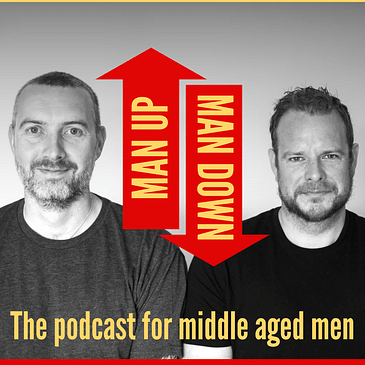This week’s episode is all about alcohol. Many of us focus on various aspects of our mental and physical health but gloss over our relationship with alcohol. Most of us like a drink, and sometimes we have a bit more than we should. And as we get older, we gain weight, and a lot is down to alcohol.
Alcohol has 7 calories per gram, almost the same as fat which has 9 calories per gram. And after a few drinks we then turn to snacks and junk food, we wouldn’t normally drink. And as we get older, our metabolism isn’t able to break calories down as quickly as they used to. That leads to us gaining weight.
Both David and Volker have both lost a significant amount of weight in the past by cutting out alcohol but accept how ingrained alcohol is in our social lives.
This is particularly true for men. Almost 59% of adult men report drinking alcohol in the past 30 days compared with 47% of adult women. Also, men are almost two times more likely to binge drink than women. Approximately 22% of men report binge drinking and on average do so 5 times a month, consuming 8 drinks per binge, according to the CDC website.
While the two of us don’t suffer from physical alcohol dependencies, we both still like a tipple. But we don’t always know when to stop either.
Volker admits that during his uni days there were times when he lost control or forgot what was going on. This is because alcohol inhibits the brain ability to construct memories.
David and Volker are both very conscious in terms of how much they drink, and if you think you aren’t in control, please contact your GP or organisations that can help you with problem drinking.
We believe alcohol is the only drug on the market where we get encouraged to take more of. No one ever says ‘come on, have another line of coke’ or ‘take another pill of x’, but people encourage you to ‘have one more drink’, or ‘don’t be a p*, have a drink’.
We share a lot of stories around alcohol, and one of the reasons is that we grew up with it, and have been in environments where it was common to drink a lot. More than one should do. And we are not the only ones, it is very common, and unfortunately it leads to relationship problems, job problems and of course poor mental health.
Regular, heavy drinking interferes with chemicals in the brain that are vital for good mental health. So while we might feel relaxed after a drink, in the long run alcohol has an impact on mental health and can contribute to feelings of depression and anxiety, and make stress harder to deal with.
Sadly, people who suffer from alcoholism are up to 120 times more likely to take their own life than those who are not dependent on alcohol. This ties in with the stats we shared previously around increased suicide rates within middle aged men.
Unfortunately though, it is still a badge of honour to be ‘hanging’ or not being a ‘lightweight’ - even at our age. If recreational drugs were tools, “alcohol would be a sledgehammer”. Few cognitive functions or behaviours escape the impact of alcohol... alcohol can disrupt or completely block the ability to form memories for events that transpire while a person is intoxicated, a type of impairment known as a blackout.
What we also realise is that when we drink, we also eat more. The munchies after a few drinks, maybe even ordering a pizza or eating a kebab, contributing to weight gain. It also impacts how well we sleep.
According to The Sleep Foundation, high amounts of alcohol (defined as more than 2 drinks for males) decreases sleep quality by 39%. According to Cancer Research no amount of alcohol is safe, and can cause 7 different types of cancer - including breast, bowel and mouth cancer as well as cancer of the liver.
Yet we are often recommended to have a little bit of alcohol. We regularly see news in the press that a glass of red wine is good for your heart.
However, it’s easy to over do it. The recommended units per week in the UK are 14 units. That’s pretty much a bottle of Shiraz. Technically a binge is 4 drinks over a 2 hour period. If you think about a football match, that’s easily done.
We need to find a positive relationship with alcohol or relationship. There is no need to have a drink, and the fantasy that wine, similar to cigars, are a status symbol and a collectors item, is a marketing ploy.
While we don’t want to tell you what to do, we encourage you to look at your relationships with drugs. And alcohol is a drug, as simple as that. Depending on your consumption, your liver can recover within 30 days, which we believe is a great incentive to do either ‘dry January’ or ‘sober in October’. Or both. Either way, reducing your alcohol consumption overall, and replacing it with maybe non alcoholic drinks or giving up completely, might be a good step. Or a very controlled way of drinking alcohol.
The vicious cycle is that when we meet people in a social setting, you want to be part of the group and drink with them, given they drink. And if we don’t drink, we get people taking the mickey out of us - which is a societal problem of not accepting people to not drink. Therefore, as a society, we still need to learn to accept people not drinking, in order to have a more healthy relationship with alcohol.
On the plus side, the availability of alcohol free drinks and beers are now on the rise, so it is easier to not drink “under the radar” in situations where others might pressure you to.
Have you overcome a tricky relationship with alcohol and want to share your story? Who should we speak to in order to investigate this topic further? Please let us know on podcast@manupdown.com
Hosted on Acast. See acast.com/privacy for more information.




